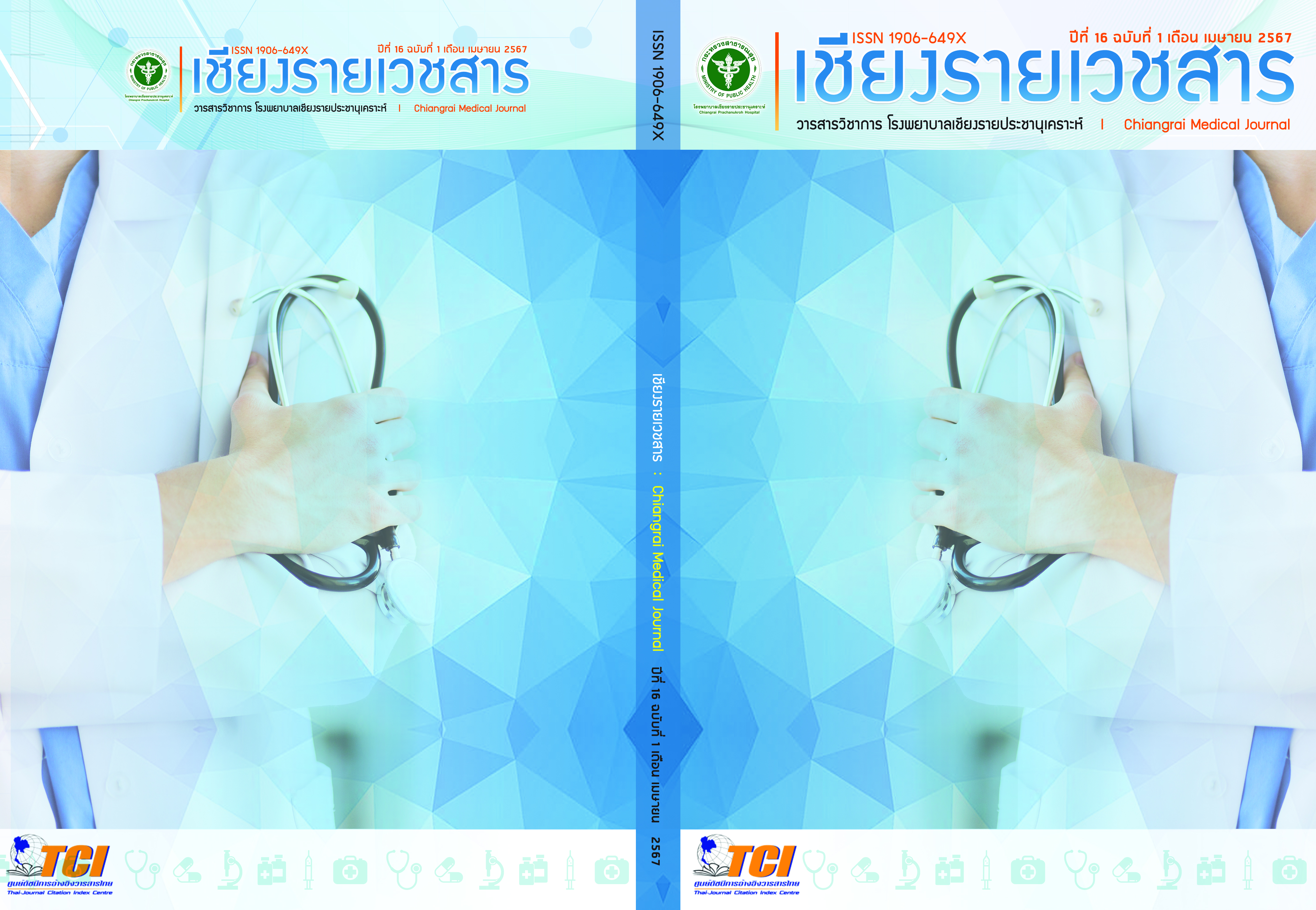Self-Care Management of Long Covid Patients in Mae Chan Sub-district, Mae Chan District, Chiangrai Province
Main Article Content
Abstract
BACKGROUND: COVID-19 is a significant infectious disease. Even after recovery, certain patients may persistently experience the same symptoms or develop new and chronic symptoms. These enduring effects can significantly impact the patient's body and long-term quality of life. The study of the self-care management of Long COVID patients can be used to plan activities for Long COVID patients.
OBJECTIVE: To study the levels and factors associated with self-care management of long-term COVID patients in Mae Chan district, Chiangrai province.
METHODS: This research constituted a cross-sectional descriptive study involving 100 Long Covid patients receiving services at the Mae Chan Community Health Center in Mae Chan, Chiangrai province. This study gathered data through questionnaires administered between September and December 2022. The analysis employed statistical measures such as frequency, percentage, mean, standard deviation, chi-square test, and Spearman's rank correlation coefficient. A p-value less than 0.05 was statistically significant.
RESULTS: Self-care management of patients with residual symptoms after COVID-19 recovered was at a high level (𝑥̅= 3.74, +S.D. = 0.99). The education level was statistically significant factors with a low level of correlation with self-care management (rs=0.236, p=0.018, 95%CI: 0.051 to 0.416), while other factors were not statistically significant with self-care management of long-term COVID patients.
CONCLUSIONS AND RECOMMENDATION: The study results revealed that some patients still have low to moderate levels of self-management of their health. Relevant agencies should utilize this information to plan and enhance the nursing service system, emphasizing the promotion of knowledge and awareness regarding patients' self-management of their health post-recovery from COVID-19.
Article Details

This work is licensed under a Creative Commons Attribution-NonCommercial-NoDerivatives 4.0 International License.
References
World Health Organization. WHO Coronavirus (COVID-19) Dashboard [Internet]. [cited 2023 Sep 1]. Available from: https://covid19.who.int/
Department of Disease Control, Ministry of Public Health. Thailand Covid-19 Situation [Thailand]. 2023 [cited 2023 Sep 1]. Available from: https://ddc.moph.go.th/covid19-dashboard/
Lotfi M, Hamblin MR, Rezaei N. COVID-19: Transmission, prevention, and potential therapeutic opportunities. Clin Chim Acta. 2020;508:254-66.
Hu B, Guo H, Zhou P, Shi ZL. Characteristics of SARS-CoV-2 and COVID-19. Nat Rev Microbiol. 2021 ;19(3):141-54.
Tantipasawasin S. Long Covid. Chonburi Hosp J. 2022;47(1):1-2.
Wangchalabovorn M, Weerametachai S, Leesri T. Prevalence of post COVID-19 conditions in SARS-CoV-2infected patients at 3-month telephone follow-up. RHPC9Journal. 2022; 16(1):265-84.
Wongsermsin S, Chinoraso J, Yeekian C. Symptom and factors effect on severity of Long Covid. Chonburi Hosp J. 2022; 47(3):233-40.
Bartholomew LK, Czyzewski DI, Parcel GS, Swank PR, Sockrider MM, Mariotto MJ, et al. Self-management of cystic fibrosis: short-term outcomes of the Cystic Fibrosis Family Education Program. Health Educ Behav. 1997;24(5):652-66.
Swannakit S, Wanchai A, Sangkhamkul C, Poonsub A. Self-management behaviors of persons with type 2 diabetes living in urban area. BCNUT J Nurs. 2021; 13(1):225-7.
Boontein P, Poungkaew A, Praphasil O, Kuakool P. Factors predicting self-management behavior in patients with type II diabetes. NURS SCI J THAIL. 2021;39(1):13-23.
Jiopraditkul S. Self–care behaviors and blood pressure controlling ability of essential hypertension patients, Muang Potawas Primary Care Unit. Journal of Health Research and Innovation. 2020;3(1):15-30.
Roongrueang J, Srisookkum T. Long Covid-19 and self-management behavior among village health volunteers who infected Covid-19 in Nanoi District, Nan Province. The Office of Disease Prevention and Control 10th Journal. 2023;21(1):37-51.
Thakkham S, Srisookkhum T. Long COVID-19 and factors related to self-care behaviors of COVID-19 patients in Kluang Sub-district, Chiang Khong District, Chiang Rai Province. Journal of Disease Prevention and Control : DPC.2 Phisanulok. 2023;10(2):49-66.
Likitkulthanaporn S, Wattanakul B, Leardrungchaisakul R. Development of self-management support for self-management behaviors in the Post-COVID 19 patients on residual symptoms in Covid-19 patients healed. Bull Dept Med Serv. 2022;47(3):104-12.
Mae Chan Community Health Center, Medical Records and Statistics Unit. Covid-19 Statistic in Mae Chan District, Chiangrai Province. Chiangrai: Mae Chan Hospital, Ministry of Public Health; 2022.
Akakul T. Research methodology in behavioral sciences and social sciences. 5th ed. Ubon Ratchathani: Witthaya offset Printing; 2007.
Best JW. Research in education. Englewood Cliffs, New Jersey: Prentice Hall; 1977.
Channarong M. Factors relating to post discharge persistence of symptoms after hospitalization among person with coronavirus disease 2019. Journal of Health and Nursing Education. 2022; 28(1):1-16.
Sinthununsakul N. Factors associated with residual symptoms of COVID-19 virus at infection among health care personnel Roi Et Hospital. Srinagarind Med J. 2023;38(1):77-86.
Tancharoensukjit T. Prevalence and factors associated with post acute COVID syndrome (Long COVID) in patients infected coronavirus disease 2019 who received inpatient treatment Lan Krabue Hospital. Bull Dept Med Serv. 2023;48(1):51-9.
Pragobsuk A, Kittijirapong C. Long COVID and health care. Thai Pharm Health Sci J. 2022;17(4):427-33.
Kampan P. Long COVID and Long-term pulmonary complications of COVID-19. Journal of Charoenkrung Pracharak Hospital. 2022;18(2):79-96.


